
Kimathi Donkor
74 3/4 x 63 in
‘Jean Charles de Menenzes borne aloft by Joy Gardner and Stephen Lawrence’ was commissioned by and exhibited in the 29th Sao Paulo Biennial (2010). It addressed three instances of racist violence against people of colour in London. Joy Gardner and Stephen Lawrence were both killed in 1993. Joy Gardner was killed by police officers who were attempting to deport her to Ghana and the 18 year old Stephen Lawrence was killed by a gang of racists who managed to evade justice for many years. The failure to charge the six youths who were arrested and mis-handling of the case by police lead to a public inquiry which concluded that London’s police force was institutionally racist. However the same police force would go on to shoot and kill Jean Charles de Menezes in 2005, an innocent man who the police claimed they mis-identified as a terrorist.
The painting, which is currently being exhibited as part of Donkor’s presentation at the Sharjah Biennial 15, subtly differs from Donkor’s works from the early 2000s about police racism and brutality. Donkor has said: “I attempted something that was just as compelling, visually: three, apparently weightless figures suspended in a blue empyrean. However, these new figures seemed to be resisting forces that appeared much less personal and more remote than an authoritarian employee with a badge or gun. The trio seemed, instead, to defy forces that were perhaps far more unrelenting and remorseless – without wishing to sound pretentious, I mean such forces as myth, power and mortality. Perhaps even nature itself, in the form of gravity. This imagery did not mean I had withdrawn from a concern with the intricate mechanisms of society, or from politics, but that my reflections of that concern had become more meditative and introspective.” (Interview with Lacuna, February 2015)
This work then can be seen as a pivotal painting that marks the move on from Donkor’s works of the early 2000s with what Donkor has described as “their terrifying execution trope’ that recalls works such as Manet’s ‘The Execution of Maximilian’. It looks forward to later Donkor works such as ‘Idylls’ that insist on the black subject’s right not to be seen solely as victims but to be active agents in the places that they find themselves in.
Exhibitions
'Black History Painting', Niru Ratnam, London 2024
‘Thinking Historically in the Present’, Sharjah Biennial 15, UAE, 2023
‘There is always a cup of sea to sail in”, 29th Sao Paulo Biennial, Brazil, 2010